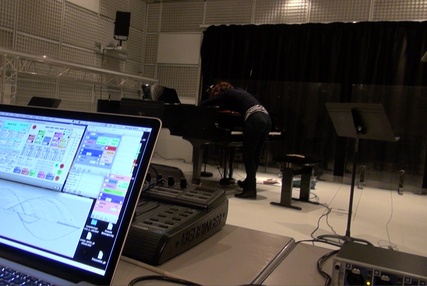jeu 22 janvier 2026,
jeu 29 janvier 2026,
jeu 5 février 2026,
jeu 12 février 2026,
jeu 19 février 2026,
14h00- 16h00
Anglais
Initiation
Tarif plein
:
550 €
Mbre Forum Premium
:
385 €
Étudiant.e
:
275 €
bach, cage, dada, ears forment une famille de bibliothèques pour Max dédiées à la composition assistée par ordinateur, développées par Andrea Agostini et Daniele Ghisi, qui peuvent fonctionner en interaction avec les autres fonctions de Max.
Cette formation propose une prise en main détaillée de ces bibliothèques, orientée vers des applications tells que la création de partitions ou de sons de synthèse. Des exemples de réalisation seront présentés tout au long de la formation. Des exercices à réaliser seront donnés à la fin de chaque séance pour être corrigés collectivement lors de la séance suivante.
![]()
Objectifs pédagogiques
À l’issue de la formation, les stagiaires seront capables d’utiliser Max comme environnement de travail pour la composition assistée par ordinateur, principalement à travers les bibliothèques bach et cage. Ils et elles seront ainsi capables d'exploiter ces outils pour générer des partitions ou des sons de synthèse.
Public concerné
Compositeurs, compositrices, musiciens, musiciennes, enseignants, enseignantes et toute personne créative ayant un socle de connaissances musicales et en informatique musicale, souhaitant s’approprier des outils d’orchestration assistée par ordinateur.
Prérequis
- Maîtrise de l’anglais à l’écrit et à l’oral (niveau B2 requis).
- Connaissance de base de Max et de son environnement : pratique et compréhension des tutoriaux de base de Max (Max Basisc tutorials 1 à 11, 14 à 22, Max Data tutorials 1 et 2, MSP tutorials, MSP Basics tutorials 1 à 5, MSP Panning tutorials 1 à 3, MSP Analysis tutorials 1 à 2, MSP Delay tutorials 1 à 3 et 6) ou avoir suivi le stage Max Initiation.
- Connaissances en solfège, lecture de notes et de rythmes.
- Bonne maîtrise d’un logiciel de gravure (Finale, Sibelius, Dorico…).
- Connaissances de base en mathématiques : arithmétique, géométrie (triangles, théorèmes de Pythagore et de Thalès, symétrie, aires), notion de puissances, équations à une variable, statistiques...
- Maîtrise de l’utilisation des principales fonctionnalités de l'ordinateur Apple (connaissance et manipulation du clavier et de la souris, créer et gérer des fichiers et des dossiers, naviguer dans les menus, lancer une application).
- Connaissance de base de l’application Zoom
- Il est recommandé de visiter site bach project avant la formation
Durée de la formation et modalités d’organisation
12h, tous les jeudis de 14h à 16h du 15 janvier au 19 février 2026
Formation en ligne, en anglais
10 stagiaires maximum
Programme de la formation
Certains détails du programme de la formation peuvent être révisés en fonction des évolutions du logiciel sur lesquel elles se basent.
Des exercices seront proposés à la fin de chaque séance, à corriger collectivement lors de la séance suivante.
Jeudi 15 janvier 2026 : prise en main
- Prise en main des éditeurs bach.roll et bach.score.
- Exemples de génération algorithmique simple dans bach.
- Exercice : créer une séquence aléatoire courte dans le bach.roll et l’éditer.
Jeudi 22 janvier 2026
- Utiliser des slots : jouer un fichier son dans une séquence avec bach.roll
- Exemples de génération algorithmique en temps-réel avec bach.roll.
- Exercice : créer une séquence algorithmique qui joue des fichiers sons à partir d’un bach.roll.
Jeudi 29 janvier 2026
- Comprendre les fonctions d’itérations dans bach.
- Présentation de la librairie cage.
- La quantification.
- Exercice : réaliser une séquence dans un bach.roll basée sur la variation progressive d’un élément. Utiliser la librairie cage pour générer le matériau de base qui sera répété et varié progressivement.
Jeudi 5 février 2026
- Utiliser la librairie cage pour des modèles technomorphiques.
- Récupérer des matériaux issus d’analyses et utiliser des sélections conditionnelles.
- Exercice : réaliser une séquence (avec une prépondérance mélodique, harmonique ou rythmique) dans un bach.roll basée sur en utilisant des matériaux issus d’analyses et modifiés à l’aide d’opérateurs de la librairie cage.
Jeudi 12 février 2026
- Introduction à la bibliothèque ears : analyse et transformation du son en temps-différé.
- Exercice : Présenter une séquence dans un bach.roll ou un bach.score comportant des sons MIDI, des échantillons et des sons transformés (spatialisés par exemple) réalisés avec la bibliothèque ears. Ces fichiers sons devront être lancés par des notes (contrôlés depuis les slots).
Jeudi 19 février 2026
- Abstractions : utilisation avec cage.meta
- Présentation de la bibliothèque « dada » : quelques modèles de génération algorithmique.
- Exercice final : QCM d’évaluation des connaissances, à remplir une semaine après la formation.
Moyens pédagogiques et techniques
- Cette formation professionnelle se tiendra en ligne.
- Besoins techniques : il est demandé de télécharger Max 9 et les bibliothèques bach, cage, dada, ears depuis le Package Manager de Max, en amont de la formation.
- Pour suivre la formation dans les meilleures conditions, il est recommandé d’utiliser deux écrans et de disposer d'une bonne connexion au réseau internet.
- Format de la formation : la formation est dispensée en anglais et alterne entre des exposés théoriques, l'étude d'exemples à analyser et des travaux pratiques.
- Supports pédagogiques : présentations, un support de cours sera remis au début de la formation et des fichiers complémentaires seront fournis au fur et à mesure.
- Des exercices à réaliser après chaque séance seront corrigés et discutés lors de la séance suivante.
Suivi
- Session technique le premier jour de la formation pour vérifier l’installation des stagiaires.
- Contrôle du suivi par la signature d’une feuille de présence pour chaque demi-journée.
- Remise d’un certificat de réalisation.
.Évaluation
- Évaluation des acquis sous la forme d’un QCM, à remplir dans la semaine qui suit la formation





